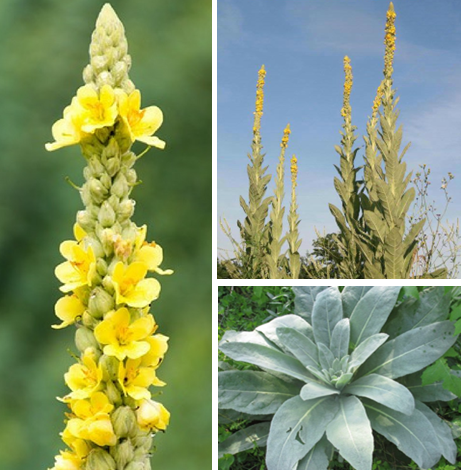
Common mullein, also known as “Lamb’s Ear,” is a biennial herbaceous plant native to Europe, Asia, and North Africa. It has since naturalized in various regions of North America and is now commonly found along roadsides, railroad tracks, and in meadows and neglected fields. The plant is characterized by its large, broad leaves covered in soft, woolly hairs and its impressive flower spike, which can reach heights of up to 8 feet.
The medicinal use of common mullein dates back thousands of years. It was employed by various cultures around the world for a wide range of ailments. Mullein tea is made by steeping dried or fresh chopped leaves in boiling water. As you boil water, tear the leaves into half-inch pieces and place one dab (as many as you can pick up with the tips of your fingers) in a coffee mug. Pour the boiling water over the leaves and allow to steep for ten minutes. Add raw honey both for flavor and to strengthen the medicine. Drink four cups a day as hot as tolerable.
Common Mullein may be used to treat the following medical issues:
Respiratory Health: Common Mullein promotes overall lung health. It helps soothe coughs, and alleviates symptoms from bronchitis, emphysema, asthma, and COPD. Used as a tea, the plant’s soothing properties help ease inflammation and clear congestion in the airways. Common Mullein is an expectorant, inducing coughing to eliminate mucous. Native Americans also smoked the dried leaves to clean tar from the lungs accumulated from prolonged tobacco use.
Stomach Upset: Common Mullein tea (prepared in each instance the same way as described above) may be used to relieve upset stomach caused by indigestion, inflammation, gastritis, and other gastro-intestinal disorders.
Ear Infections: Mullein oil, made by steeping the flowers in olive oil, has been traditionally used to treat ear infections. A few drops of warm mullein oil can help relieve earache and discomfort.
Anti-Inflammatory: Common mullein has anti-inflammatory properties, making it useful for reducing pain and inflammation associated with conditions like arthritis. Compresses or poultices made from mullein leaves can be applied topically for relief.
Skin Health: The antimicrobial and anti-inflammatory properties of mullein have also been applied to treat skin conditions such as eczema, wounds, and burns. A salve or ointment made from mullein leaves using a base of olive oil and coconut oil can be applied to the affected area.
Anti-Anxiety: Common Mullein has mild anxiolytic (anti-anxiety) properties. It can be used as a calming tea to reduce stress and anxiety.Anti-Bacterial: Common mullein has shown potential as an antimicrobial agent, making it useful for fighting off bacterial infections.
Precautions:
While common mullein is generally considered safe when used as directed, there are a few precautions to keep in mind:
Allergies: Individuals with known allergies to plants in the Scrophulariaceae family should exercise caution when using common mullein.
Pregnancy and Breastfeeding: Pregnant or breastfeeding individuals should consult with a healthcare professional before using common mullein.
Children: Herbal remedies containing mullein may not be suitable for young children, so it’s important to seek professional guidance.
